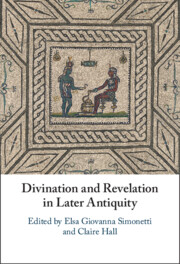Book contents
- Divination and Revelation in Later Antiquity
- Divination and Revelation in Later Antiquity
- Copyright page
- Contents
- Illustrations
- Notes on Contributors
- Acknowledgements
- Introduction
- Part I Philosophical Perspectives on Divination, Revelation, and Prophecy
- Part II Status, Role, and Functions of Human Intermediaries
- Part III Divine Transcendence and Pragmatic Purposes
- Index
- References
Introduction
Published online by Cambridge University Press: 19 October 2023
- Divination and Revelation in Later Antiquity
- Divination and Revelation in Later Antiquity
- Copyright page
- Contents
- Illustrations
- Notes on Contributors
- Acknowledgements
- Introduction
- Part I Philosophical Perspectives on Divination, Revelation, and Prophecy
- Part II Status, Role, and Functions of Human Intermediaries
- Part III Divine Transcendence and Pragmatic Purposes
- Index
- References
Summary
This volume aims to explore the tension between two aspects of divination: while it is supposed to be a divine gift founded on inspiration, it also requires human conjecture and specific skills. Divination therefore is understood as involving not only a variety of methods of knowing but also a variety of types of knowledge. This tension can be understood as an arrangement along two different axes: one axis, concerning the mode of divination, is a spectrum which runs from entirely inspired divination to entirely conjectural divination; the other axis, which concerns the type of knowledge or the objects of divination, runs from contingency to transcendence.
These two axes correspond to divisions defined since antiquity. On the one hand, ancient authors recognised the division between ‘natural’ divination, based on inspiration (as in possession, oracles, visions, or dreams), and ‘technical’ divination, based on conjecture (as in augury, astrology, extispicy, and generally the interpretation of signs).
- Type
- Chapter
- Information
- Divination and Revelation in Later Antiquity , pp. 1 - 14Publisher: Cambridge University PressPrint publication year: 2023

